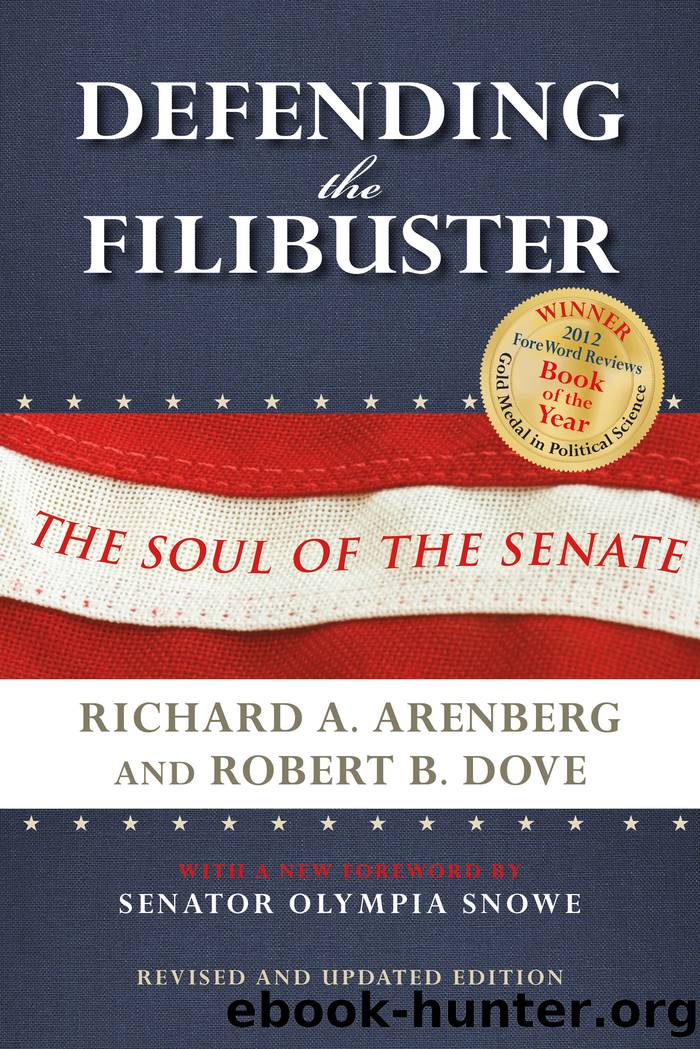Defending the Filibuster by Richard A. Arenberg

Author:Richard A. Arenberg
Language: eng
Format: epub
Publisher: Indiana University Press
Published: 2018-10-15T00:00:00+00:00
BINDING FUTURE CONGRESSES
The question of majorities binding future majorities and legislatures binding future legislatures is central to the constitutional option argument. This is particularly true because the Senate acted in 1959 to adopt Senate Rule V, making clear its view that the rules continue. The question arises whether that rule binds future Senates.
There are many circumstances in which the Congress âbindsâ future Congresses in much the same way. These provisions, like Rule V, however, do not truly bind the future bodies, because the Congress is able, under the rules, to change or reverse the actions. Examples include laws that Congress has passed that impose expedited procedures affecting activities of both houses, their committees, and the role of senators in shaping public policy through debate and amendments.
In addition, the Budget Act of 1974 created the reconciliation process, and the budget process itself has been amended. In addition, the Senate has imposed the Byrd rule on itself to limit amendments under reconciliation. These have binding characteristics on the Congress that can be waived only by supermajority votes. Actually, Rule XXII is less binding because it applies only to debate and the rules themselves can be amended by a simple majority vote.
As mentioned earlier, the compromise in the 1980 Alaska Lands Act requires that any oil and gas drilling in the pristine Arctic National Wildlife Refuge be approved by future law. Senator Ted Stevens (R-AK), seeking to permit drilling, argued 22 years later for just such a law: âOne Congress cannot bind another Congress. But one Congress can enact a law that it takes another Congress to enact and have a President sign it. This is one of the things that was required, and it was a great error of my career in agreeing that the area would be open only if a subsequent law was passed by Congress.â50
Senator Stevensâs regrets at having agreed to the compromise notwithstanding, no one argues, not even the late Senator Stevens, that it does not require the Congress to take a future action in order to overcome the prohibition put in place by the 107th Congress.
Also, in the Constitution, the Founders bound all future Congresses, the states, constitutional conventions, and potentially huge majorities of the American people when they wrote in Article V âthat no State, without its Consent, shall be deprived of its equal Suffrage in the Senate.â51
Finally, James Madison, in a letter to Thomas Jefferson written on February 4, 1790, refers to three categories: (1) constitutions; (2) âlaws irrevocable at the will of the legislatureâ (italics added); and (3) âlaws involving no such irrevocable quality.â Clearly, he saw the second as a legitimate category of laws. Madison writes:
On what principle does the voice of the majority bind the minority? It does not result I conceive from the law of nature, but from compact founded on conveniency. A greater proportion might be required by the fundamental constitution of a Society, if it were judged eligible. Prior then to the establishment of this principle, unanimity was necessary;
Download
This site does not store any files on its server. We only index and link to content provided by other sites. Please contact the content providers to delete copyright contents if any and email us, we'll remove relevant links or contents immediately.
| Antitrust | Civil Law |
| Emigration & Immigration | Federal Jurisdiction |
| Housing & Urban Development | Indigenous Peoples |
| Land Use | Public |
| Public Contract | Public Utilities |
| Urban, State & Local Government |
Machine Learning at Scale with H2O by Gregory Keys | David Whiting(4280)
Killers of the Flower Moon by David Grann(4022)
Oathbringer (The Stormlight Archive, Book 3) by Brandon Sanderson(3108)
Will by Will Smith(2891)
Once Upon a Broken Heart by Stephanie Garber(2817)
Guns, Germs and Steel by Diamond Jared(2350)
It Starts With Us (It Ends with Us #2) by Colleen Hoover(2317)
Borders by unknow(2297)
Friends, Lovers, and the Big Terrible Thing by Matthew Perry(2208)
The Room Where It Happened by John Bolton;(2140)
The Color of Law by Richard Rothstein(1912)
The Strength In Our Scars by Bianca Sparacino(1828)
HBR's 10 Must Reads 2022 by Harvard Business Review(1828)
A Short History of War by Jeremy Black(1827)
A Game of Thrones (The Illustrated Edition) by George R. R. Martin(1691)
Water Rights and the Environment in the United States by John Burch(1670)
515945210 by Unknown(1653)
Examples & Explanations: Administrative Law by William F. Funk & Richard H. Seamon(1628)
That Every Man Be Armed by Stephen P. Halbrook(1569)
